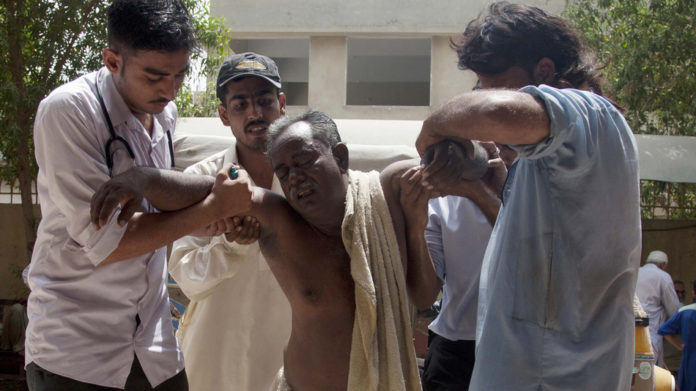Pakistan heat wave, power failures kill over 600 people in Karachi

The 23.5 million residents of Karachi have suffered through a deadly combination of high heat, extremely high humidity, and frequent power outages that disabled fans and air conditioners throughout the teeming Pakistani port city since the weekend.
The death toll is creeping toward 700, with 622 deaths reported by the AP. But heat-related deaths are often undercounted, since heat can be a contributing factor to death, but not the primary cause, in many instances.
The heat wave struck at a particularly inopportune time, during the holy fasting month of Ramadan, when the majority of people in Karachi abstain from food or water during the day; this makes people more vulnerable to heat stroke and other heat-related ailments. Unfortunately, the forecast is predicting more heat — although potentially less severe — to come.
Temperatures have reached a scorching 113 degrees Fahrenheit in parts of Karachi, Pakistan’s most populous city, since late last week. At Jinnah International Airport in Karachi, the high temperature rose above 100 degrees Fahrenheit every day since June 18, with overnight lows in the low to mid-80s Fahrenheit.
A man getting heat stroke treatment right in the middle of the road in Karachi.Plz wake up
#SindhGovt pic.twitter.com/8GLOcx5AR9
— ABDUL RAFAY TIRMIXI (@Rafay007Abdul) June 23, 2015
Forecasts don’t show much relief in the near-term, as the South Asian Monsoon creeps northward throughout India, and rains gradually become more likely in Pakistan, as well.
Power outages also affected the sporadic water supply in Karachi, where those who can afford it rely on tankers of water being delivered to their homes.
Most who have died are the elderly, according to Seemi Jamali, a spokeswoman for Karachi’s Jinnah Hospital. Thousands more are being treated for heat-related ailments, including fever, dehydration and stomach-related illnesses, Jamali said.
Many arrived at the hospital already unconscious or staring out blankly. Some fainted in hospital doorways, while patients lay on public benches and crowded corridors in wheelchairs and stretchers. Panicked families fought with hospital staff to admit their loved ones.
Meanwhile, mortuaries were running out of space, with local television stations showing bodies stacked inside of cold storage rooms of morgues.
PTI Relief Camp for Heat Stroke Victims is now operational inside Jinnah hospital. pic.twitter.com/npTI9DkCcn
— PTI Karachi Official (@PTI_KHI) June 23, 2015
“We’re dying, and we’re being told to wait,” said Moazzam Ali, as two women comforted his badly dehydrated mother, who was awaiting medical care.
Provincial Chief Minister Qaim Ali Shah ordered schools and public offices closed Tuesday until the heat wave ends. He blamed Pakistani federal government for the deaths, saying they didn’t respond to his appeals to fix the power grid.
Abid Sher Ali, a junior federal minister for water and power, in turn blamed Karachi’s government for the deaths, saying they couldn’t manage their own affairs.
Meteorologist Abdur Rauf called the heat wave the worst in at least a decade to strike Pakistan.
The heat inflamed tempers in the overcrowded city. Angry mobs protesting the power outages and lack of water blockaded several roads, burning tires. Police official Aslam Khan said there was no violence, though he called it an “anarchy-like situation” in some neighborhoods.
Karachi’s residents tried to find running water to cool off at public taps or broken pipes. Some bathed with their clothes on, while others washed their hands, faces and heads. As power outages rolled across the city, women and children walked down roads looking for shelter after leaving their small, suffocatingly hot homes.
Some expressed shock at how bad it had gotten.
“It seems as if there’s no government,” said businessman Salamat Hussain.
Last month, nearly 1,700 people died in a heat wave in neighboring India. That event was also worsened by power outages and lack of air conditioning.
Although heat waves are not new to Pakistan and India, studies have established clear links between global warming and more frequent and severe heat waves around the world.
A major new report on climate change and public health, published Monday by UK medical journal The Lancet, found that global warming constitutes a “medical emergency” that threatens to undo the development gains made during the past several decades. The report specifically cites the danger of more severe heat wave-related illnesses and deaths.
Additional reporting by Mashable’s Huizong Wu and The Associated Press
Have something to add to this story? Share it in the comments.
